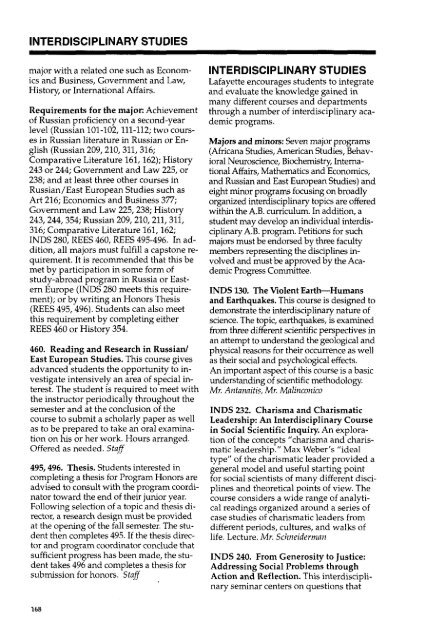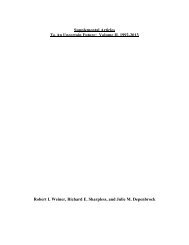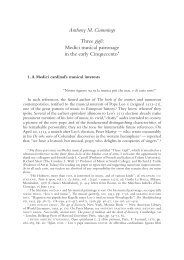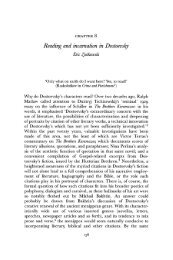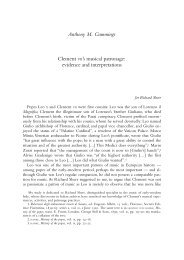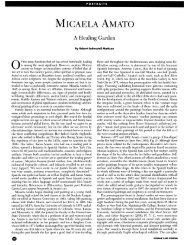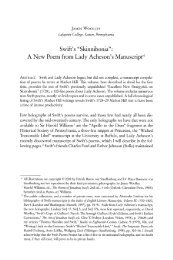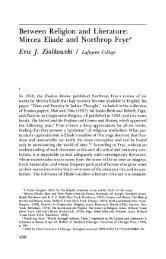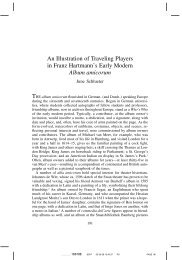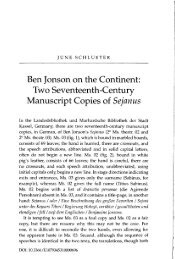courses of instruction - Lafayette College
courses of instruction - Lafayette College
courses of instruction - Lafayette College
You also want an ePaper? Increase the reach of your titles
YUMPU automatically turns print PDFs into web optimized ePapers that Google loves.
INTERDISCIPLINARY STUDIES<br />
major with a related one such as Econom<br />
ics and Business, Government and Law,<br />
History, or International Affairs.<br />
Requirements for the major: Achievement<br />
<strong>of</strong> Russian pr<strong>of</strong>iciency on a second-year<br />
level (Russian 101-102,111-112; two cours<br />
es in Russian literature in Russian or En<br />
glish (Russian 209,210, 311, 316;<br />
Comparative Literature 161,162); History<br />
243 or 244; Government and Law 225, or<br />
238; and at least three other <strong>courses</strong> in<br />
Russian/East European Studies such as<br />
Art 216; Economics and Business 377;<br />
Government and Law 225, 238; History<br />
243, 244, 354; Russian 209, 210,211, 311,<br />
316; Comparative Literature 161,162;<br />
INDS 280, REES 460, REES 495-496. In ad<br />
dition, all majors must fulfill a capstone re<br />
quirement. It is recommended that this be<br />
met by participation in some form <strong>of</strong><br />
study-abroad program in Russia or East<br />
ern Europe (INDS 280 meets this require<br />
ment); or by writing an Honors Thesis<br />
(REES 495, 496). Students can also meet<br />
this requirement by completing either<br />
REES 460 or History 354.<br />
460. Reading and Research in Russian/<br />
East European Studies. This course gives<br />
advanced students the opportunity to in<br />
vestigate intensively an area <strong>of</strong> special in<br />
terest. The student is required to meet with<br />
the instructor periodically throughout the<br />
semester and at the conclusion <strong>of</strong> the<br />
course to submit a scholarly paper as well<br />
as to be prepared to take an oral examina<br />
tion on his or her work. Hours arranged.<br />
Offered as needed. S taff<br />
495,496. Thesis. Students interested in<br />
completing a thesis for Program Honors are<br />
advised to consult with the program coordi<br />
nator toward the end <strong>of</strong> their junior year.<br />
Following selection <strong>of</strong> a topic and thesis di<br />
rector, a research design must be provided<br />
at the opening <strong>of</strong> the fall semester. The stu<br />
dent then completes 495. If the thesis direc<br />
tor and program coordinator conclude that<br />
sufficient progress has been made, the stu<br />
dent takes 496 and completes a thesis for<br />
submission for honors. Staff<br />
168<br />
INTERDISCIPLINARY STUDIES<br />
<strong>Lafayette</strong> encourages students to integrate<br />
and evaluate the knowledge gained in<br />
many different <strong>courses</strong> and departments<br />
through a number <strong>of</strong> interdisciplinary aca<br />
demic programs.<br />
Majors and minors: Seven major programs<br />
(Africana Studies, American Studies, Behav<br />
ioral Neuroscience, Biochemistry, Interna<br />
tional Affairs, Mathematics and Economics,<br />
and Russian and East European Studies) and<br />
eight minor programs focusing on broadly<br />
organized interdisciplinary topics are <strong>of</strong>fered<br />
within the A.B. curriculum. In addition, a<br />
student may develop an individual interdis<br />
ciplinary A.B. program. Petitions for such<br />
majors must be endorsed by three faculty<br />
members representing the disciplines in<br />
volved and must be approved by the Aca<br />
demic Progress Committee.<br />
INDS130. The Violent Earth Humans<br />
and Earthquakes. This course is designed to<br />
demonstrate the interdisciplinary nature <strong>of</strong><br />
science. The topic, earthquakes, is examined<br />
from three different scientific perspectives in<br />
an attempt to understand the geological and<br />
physical reasons for their occurrence as well<br />
as their social and psychological effects.<br />
An important aspect <strong>of</strong> this course is a basic<br />
understanding <strong>of</strong> scientific methodology.<br />
Mr. Antanaitis, Mr. Malinconico<br />
INDS 232. Charisma and Charismatic<br />
Leadership: An Interdisciplinary Course<br />
in Social Scientific Inquiry. An explora<br />
tion <strong>of</strong> the concepts "charisma and charis<br />
matic leadership." Max Weber's "ideal<br />
type" <strong>of</strong> the charismatic leader provided a<br />
general model and useful starting point<br />
for social scientists <strong>of</strong> many different disci<br />
plines and theoretical points <strong>of</strong> view. The<br />
course considers a wide range <strong>of</strong> analyti<br />
cal readings organized around a series <strong>of</strong><br />
case studies <strong>of</strong> charismatic leaders from<br />
different periods, cultures, and walks <strong>of</strong><br />
life. Lecture. Mr. Schntiderman<br />
INDS 240. From Generosity to Justice:<br />
Addressing Social Problems through<br />
Action and Reflection. This interdiscipli<br />
nary seminar centers on questions that


